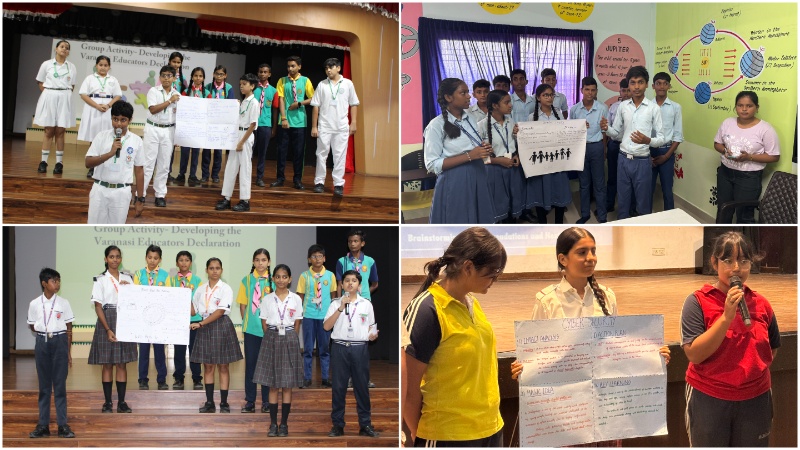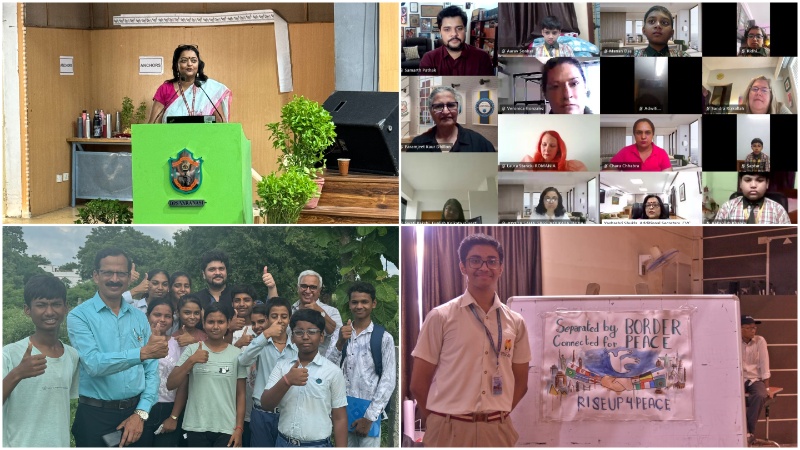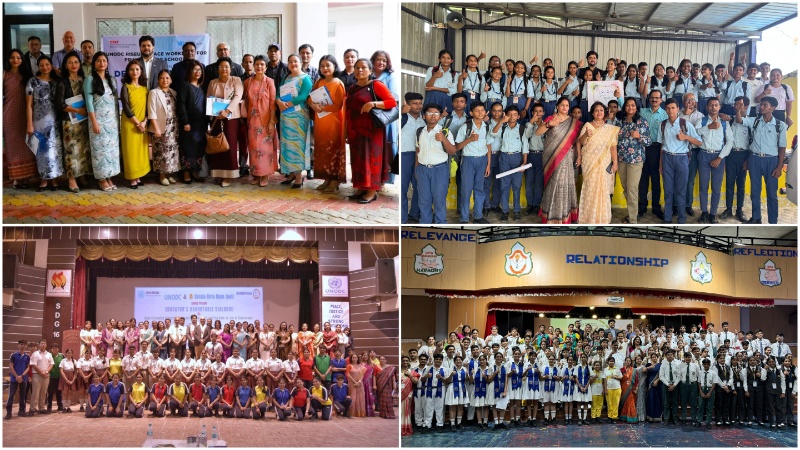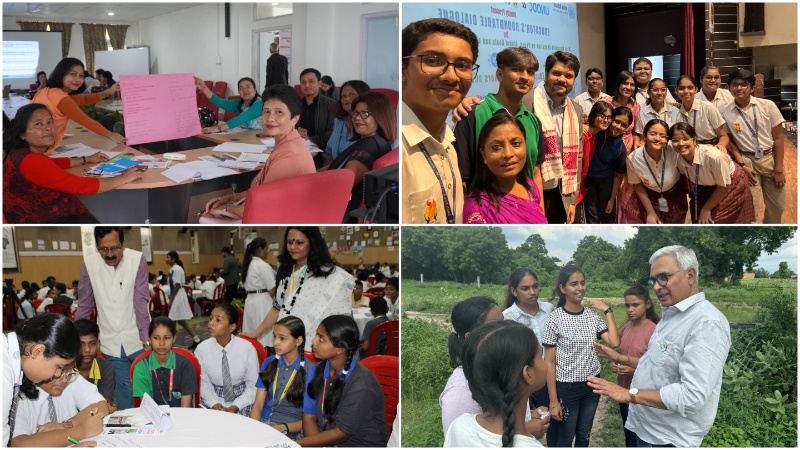India: Educators and Students Champion Integrity, Peace and Lawfulness with UNODC’s RiseUp4Peace Initiative
New Delhi, India/31 August 2024: “Education must go beyond textbooks. It’s about shaping hearts and minds to build a future where peace and justice prevail,” says Ranjana Harlalka, an educator, looking at a creative doodle made by a student on ‘imagined borders’.
This profound belief in the transformative power of education drives the RiseUp4Peace initiative, spearheaded by UNODC and educator partners in classrooms across India. Educators like Ranjana are at the heart of this movement, enhancing critical life skills that will define their students’ futures.
This matters more than ever in today’s fast-paced world, where young people are facing significant challenges. Addressing these issues through education is vital for fostering resilience and creating a supportive environment for students. Supported by inspiring educator partners, UNODC’s RiseUp4Peace initiative is empowering the next generation to resist negative influences and embrace positive values.
This month, over 300 educators and 4,200 students across India and 35 countries explored with UNODC practical classroom interventions on themes such as integrity and ethics, mental health, gender equality and cyber safety—issues that resonate deeply with young minds.

With hands-on activities, open reflections and ideation in mixed groups, educators and young people collaborated to highlight emerging vulnerabilities and ways to integrate education on SDG16 in lessons—through art, AI tools and targeted school programs. For instance, 64 students from 32 Jalandhar Sahodaya Schools hosted by Kamla Nehru Public School (KNPS) Phagwara produced vlogs to advocate messages on integrity and anti-corruption.
In Shillong, Meghalaya, the Directorate of Educational Research and Training (DERT) Meghalaya collaborated with UNODC to focus on enhancing educators’ capacity to address student vulnerabilities, bringing together educators from 22 schools.
Ideating in groups, educators shared a range of school-focused good practices, such as a buddy program to identify risky behaviours, student clubs on reducing digital footprint and increased sensitization initiatives on mental health and cybersecurity.
“This workshop has been transformative,” Ms. Laila, a participating educator, said. “This is not just about adding to our curriculum; it’s about fundamentally changing how we approach these critical issues.”
“To support our students effectively, we must address their emotional and psychological needs as well as their academic growth. It’s essential that we equip our educators with innovative tools and strategies to address these issues effectively, ensuring that our schools are places where students feel safe and supported," said Ms. RS Manners, Director of DERT Meghalaya, highlighting the need for an evolved educational approach.

In Guwahati (Assam), educators and students from 16 schools echoed similar sentiments at the Sarala Birla Gyan Jyoti School, sharing revealing insights on gender-based violence, online harassment and anxieties. Students’ explored using art, street plays and video blogs as mediums to promote social awareness for change. “It feels good to be doing something that matters. I feel more empowered to talk about gender equality and make a positive difference,” a young participant said.
Students like Pratibha Das found new confidence at DPS Varanasi, where 17 public, private and rural schools were convened in collaboration with the CBSE Varanasi Sahodaya Complex. “It was amazing to see how our ideas were valued. I learned how I can use my network-building skills to address cybercrime among the elderly,” she said. This engagement led to schools calling for stronger peer support networks, video campaigns and student clubs focused on mental health, anti-corruption and cyber awareness.
The initiative has also empowered educators and enhanced their ability to address complex social themes and SDGs within their classrooms. The demand for this initiative has been overwhelming, with more schools requesting similar workshops and follow-up sessions. Educators are integrating the lessons into their daily teaching, using art, technology, and research to make learning more engaging.

“Teaching lawfulness isn’t just about rules and regulations, it’s about helping students understand why those rules matter. The insights we discussed will help me craft lessons that inform and inspire students to be responsible citizens,” said Kajal Tripathi, an educator. “Role-playing scenarios and open dialogues on fairness, equality and ethical dilemmas help students learn and live these values," said Jaimala Tewari, a school Principal.
Bridging divides, the RiseUp4Peace initiative also reached Mirzamurad, a village 50 kilometers from Varanasi in Uttar Pradesh, where over the last four years, UNODC has been collaborating with the Round Table Abhinav Vidyalaya (RTAV) to create a powerful circle of impact at the rural level.
Reflecting on negative digital influences and discrimination, students and RTAV alumni—RiseUp4Peace champions—brainstormed challenges and solutions with peer-to-peer learning. Their honest thoughts--“I want to be judged for my abilities, not my gender,” “I get anxious thinking about the future,” “taunting hurts”-revealed a pressing need for education and more open ‘safe space’ dialogues.
A focus on good practices and policy linkages with the National Education Policy (NEP) 2020 provided a framework for integrating these critical themes into everyday educational practices.

Yashashri Shukla, Additional Secretary, Central Vigilance Commission, noted, “The enthusiasm and innovative thinking displayed are a testament to the power of youth in driving positive change. Education can enable sensitization of students on integrity & ethics.” Her sentiments were echoed by AN Ramachandra, former Joint Commissioner (Academic), Navodaya Vidyalaya Samity, Satya Bhushan, Assistant Professor, NCERT, Samarth Pathak from UNODC and PK Dhillon from KNPS Phagwara.
The impact of RiseUp4Peace is clear: it has not only equipped educators with the tools to foster supportive learning environments, but also empowered students to become proactive in addressing societal issues. In the process, they realise their own potential: in public speaking, leadership, empathy and creativity.
Mr. Mukesh Shelat, Principal of DPS Varanasi, agrees. “The power of collective action and interdisciplinary approaches is key to tackle crime, drugs and risky behaviours. We need more such initiatives to sustain the momentum and amplify impact.”
Join the RiseUp4Peace initiative: t.ly/SjWRq
The activity contributed to SDG 4, SDG 5, SDG 16 and SDG 17: https://sdg-tracker.org/
